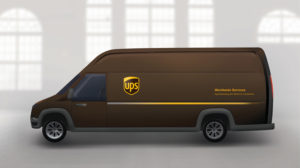UPS announced it plans to deploy 50 plug-in electric delivery trucks that will be comparable in acquisition cost to conventional-fueled trucks without any subsidies. This is an industry first that is breaking a key barrier to large scale fleet adoption.
“Electric vehicle technology is rapidly improving with battery, charging and smart grid advances that allow us to specify our delivery vehicles to eliminate emissions, noise and dependence on diesel and gasoline,” said Carlton Rose, President, Global Fleet Maintenance and Engineering for UPS. “With our scale and real-world duty cycles, these new electric trucks will be a quantum leap forward for the purpose-built UPS delivery fleet. The all electric trucks will deliver by day and re-charge overnight. We are uniquely positioned to work with our partners, communities and customers to transform freight transportation.”
Workhorse Group
Workhorse claims these vehicles provide nearly 400% fuel efficiency improvement as well as optimum energy efficiency, vehicle performance and a better driver experience. Each truck will have a range of approximately 100 miles between charges, ideal for delivery routes in and around cities. The class 5, zero emission delivery trucks will rely on a cab forward design, which optimizes the driver compartment and cargo area, increasing efficiency and reducing vehicle weight. The new trucks will join the company’s Rolling Lab, a growing fleet of more than 9,000 alternative fuel and advanced technology vehicles.
“This innovation is the result of Workhorse working closely with UPS over the last 4 years refining our electric vehicles with hard fought lessons from millions of road miles and thousands of packages delivered,” said Steve Burns, CEO of Workhorse Group. “Our goal is to make it easy for UPS and others to go electric by removing prior roadblocks to large scale acceptance such as cost.”
Testing in US markets
UPS will test the vehicles primarily on urban routes across the country, including Atlanta, Dallas and Los Angeles. With zero emissions and lower noise, the electric delivery trucks will help UPS make its fleet cleaner and quieter, a significant benefit in urban areas.
Following real-world test deployments, UPS and Workhorse will fine-tune the design in time to deploy a larger fleet in 2019 and beyond. Since most of the maintenance costs of a vehicle are associated with the engine and related components, UPS expects the operating cost of the new plug-in electric vehicle to be less than a similarly equipped diesel or gasoline vehicle.
UPS’s goal is to make the new electric vehicles a standard selection, where appropriate, in its fleet of the future. UPS has approximately 35,000 diesel or gasoline trucks in its fleet that are comparable in size and are used in routes with duty cycles, or daily miles traveled similar to the new electric vehicles.
UPS: 1.000 electric and hybrid trucks
UPS has more than 300 electric vehicles deployed in Europe and the U.S., and nearly 700 hybrid electric vehicles. The company recently ordered 125 new fully-electric Semi tractors to be built by Tesla in 2019, the largest pre-order to date. Additionally, last September, UPS announced it will become the first commercial customer in the U.S. to start using three medium-duty electric trucks from Daimler Trucks Fuso brand, called the eCanter.
The initiative will help UPS attain its goal of one in four new vehicles purchased by 2020 being an alternative fuel or advanced technology vehicle. The fleet includes all-electric, hybrid electric, hydraulic hybrid, ethanol, compressed natural gas (CNG), liquefied natural gas (LNG) and propane. For more information on UPS’s sustainability initiatives, please visit www.ups.com/sustainability.
Source and picture: UPS

